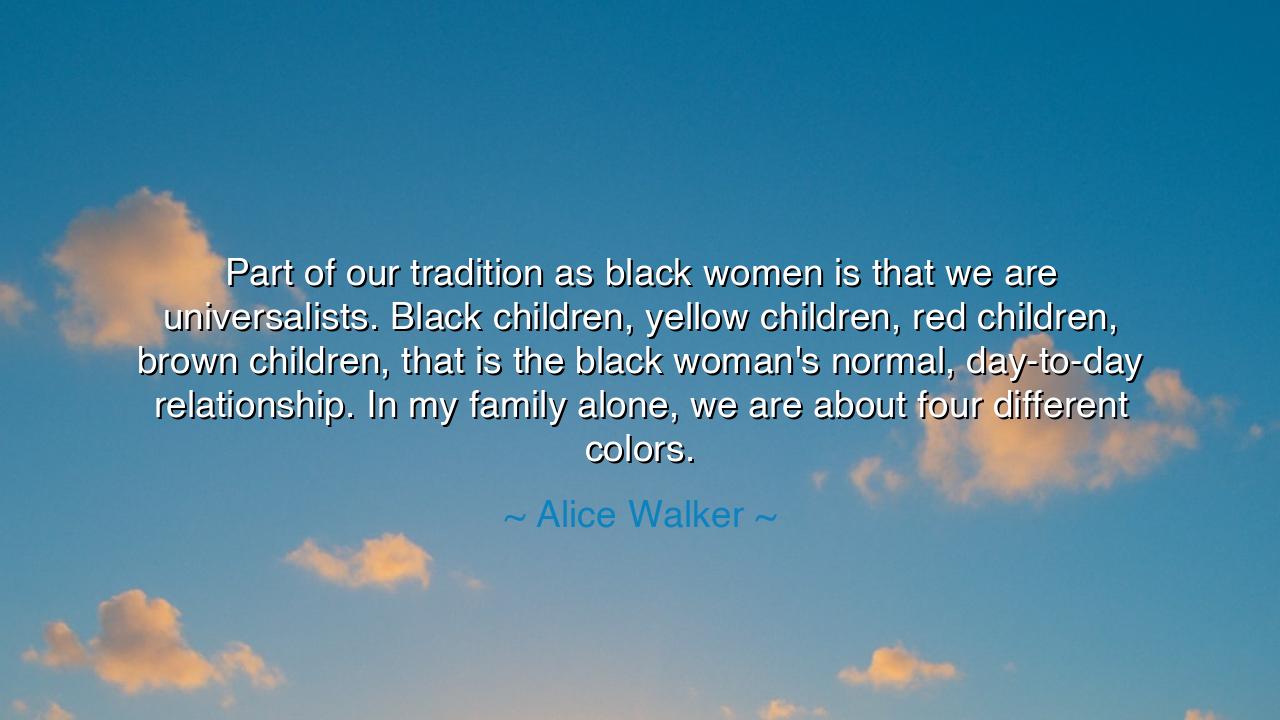
Part of our tradition as black women is that we are
Part of our tradition as black women is that we are universalists. Black children, yellow children, red children, brown children, that is the black woman's normal, day-to-day relationship. In my family alone, we are about four different colors.






In the luminous and unyielding words of Alice Walker, poet of freedom and chronicler of the soul, we encounter a truth both personal and eternal: “Part of our tradition as black women is that we are universalists. Black children, yellow children, red children, brown children, that is the black woman’s normal, day-to-day relationship. In my family alone, we are about four different colors.” These words are not spoken in mere observation, but in revelation. They speak of a legacy carved from struggle, nurtured in compassion, and rooted in the understanding that humanity is one body with many shades. Walker’s voice, gentle yet commanding, reminds us that the black woman—long burdened by history—has also been the bridge between worlds, the quiet guardian of a universal love that transcends race and division.
Alice Walker, born in Georgia during the age of segregation, lived in a world where color was both weapon and wound. Yet she emerged as one of the great voices of reconciliation—an artist who refused to be bound by bitterness, who saw in diversity not division, but divine variety. Her words reflect both her personal lineage and the collective inheritance of black womanhood: the ability to embrace the world despite the world’s cruelty. When she calls black women universalists, she is not idealizing; she is describing a truth learned through endurance. The black woman, through centuries of oppression, has cultivated a vision that includes all children, all suffering, all life. Her heart, expanded by both pain and compassion, has become cosmic in its scope.
To understand this, one must look to history. For from the time of the slave ships to the present, black women have carried within them not only their own children, but the children of others—the orphaned, the abandoned, the displaced. In plantations, in segregated schools, in urban streets, they became mothers of the earth, raising lives that did not share their blood but shared their struggle. Out of this arose a kind of spiritual expansiveness—a love that refused to narrow itself by race. It is this boundless empathy that Walker names as part of their tradition: the universalism born of suffering and endurance, the understanding that to be fully human is to see every child, every color, as one’s own.
Walker’s observation finds a mirror in the story of Harriet Tubman, the Moses of her people. Tubman risked her life not once, but countless times, to lead others to freedom—not for profit, not for recognition, but out of a universal sense of duty to life itself. When she guided the enslaved through swamps and forests, she did not ask about their tribe, tone, or creed. To her, every person in bondage was a sibling of the same divine family. This, too, is the spirit of universalism that Walker speaks of: the belief that the liberation of one race is inseparable from the liberation of all.
In her words—“In my family alone, we are about four different colors”—Walker offers both a personal truth and a metaphor for the human condition. The hues of her own lineage, born of centuries of mingling and survival, symbolize the interwoven destiny of humanity. Every family, if traced far enough, is multicolored; every lineage carries within it the dust of many lands. By acknowledging this, Walker dissolves the illusion of separation. She reminds us that our differences are not walls but threads, and that the black woman’s experience—so often forced into the margins—holds within it the map to humanity’s reconciliation.
Yet this universalism does not mean blindness to injustice. Walker’s wisdom is not that of naïve harmony but of mature compassion—the kind forged through pain, forgiveness, and clarity. She does not deny race; she transcends it without erasing it. Her vision demands that love coexist with truth, that unity emerge not from denial, but from the courage to see the beauty in all creation. In this, the black woman becomes not merely a symbol of endurance, but a teacher of the world, showing that the deepest strength is not domination, but connection.
The lesson, then, is this: embrace the fullness of humanity as your inheritance. Do not allow the narrowness of the world to shrink your compassion. Let your heart, like that of the women Walker speaks for, be large enough to hold many colors, many stories, many souls. Seek not to conquer others through judgment, but to understand them through love. Remember that to see the divine, one must see it reflected in every face—dark or light, stranger or kin.
So remember, O listener of truth: the wisdom of Alice Walker is the wisdom of the ancients reborn—the reminder that the heart expanded by love becomes the dwelling place of the world. If we are to heal the wounds of history, we must learn what the black woman already knows: that we are all children of the same light, wearing different shades of the same dust. To live this truth is to become, at last, not divided tribes of man, but one great and radiant family beneath the sun.






AAdministratorAdministrator
Welcome, honored guests. Please leave a comment, we will respond soon